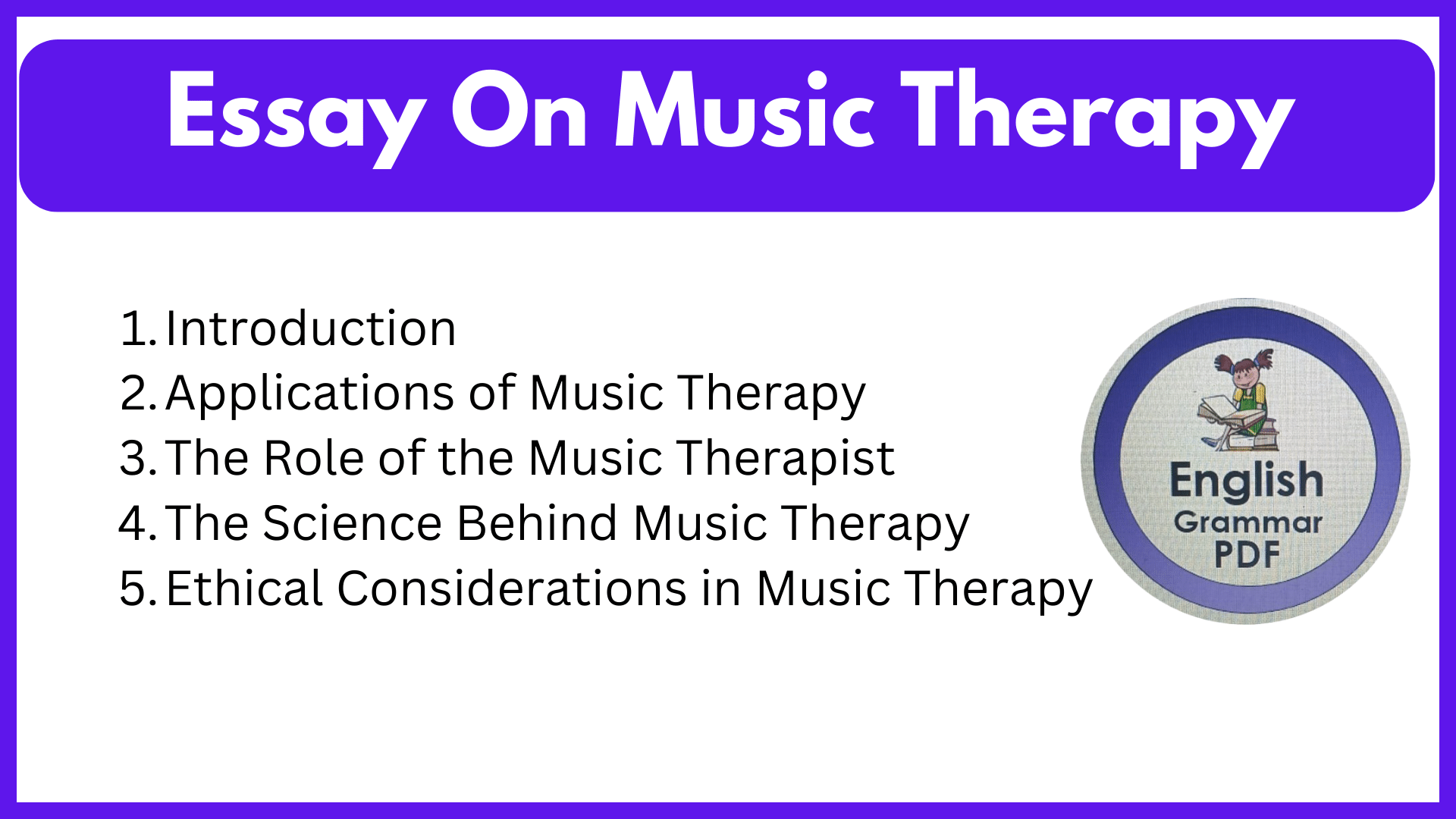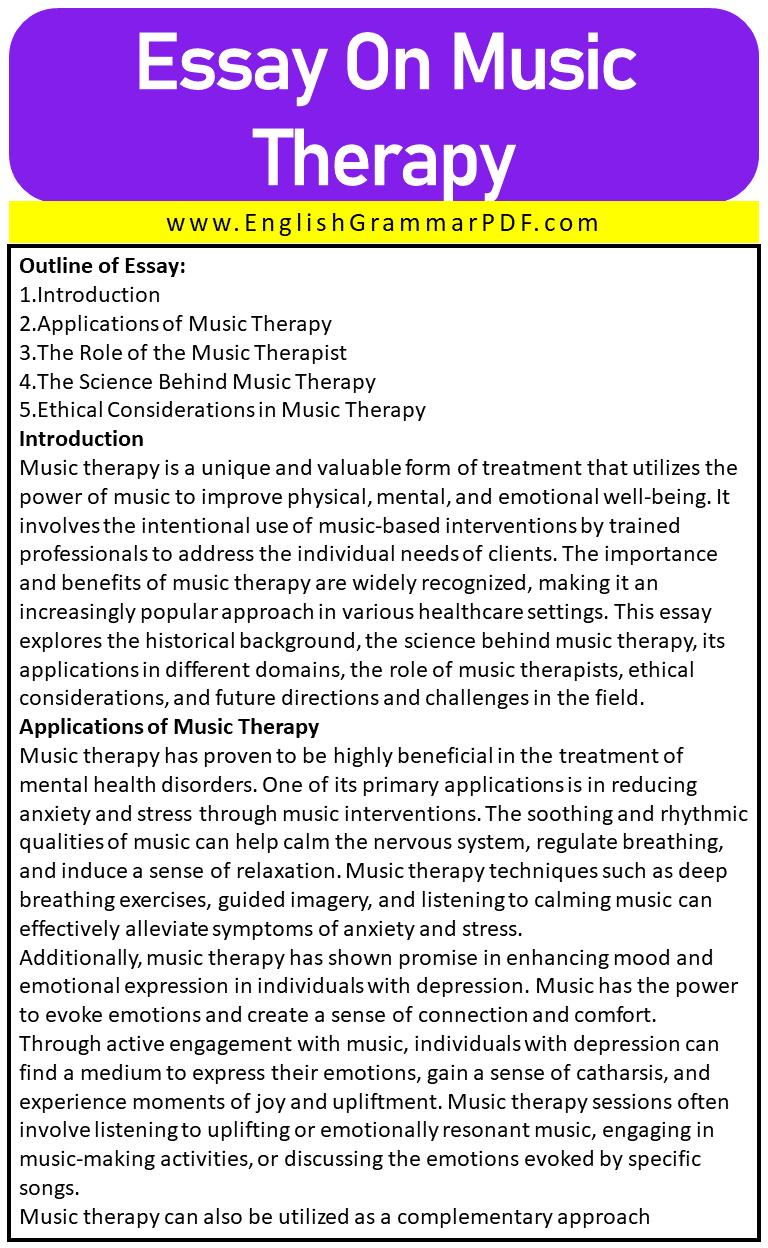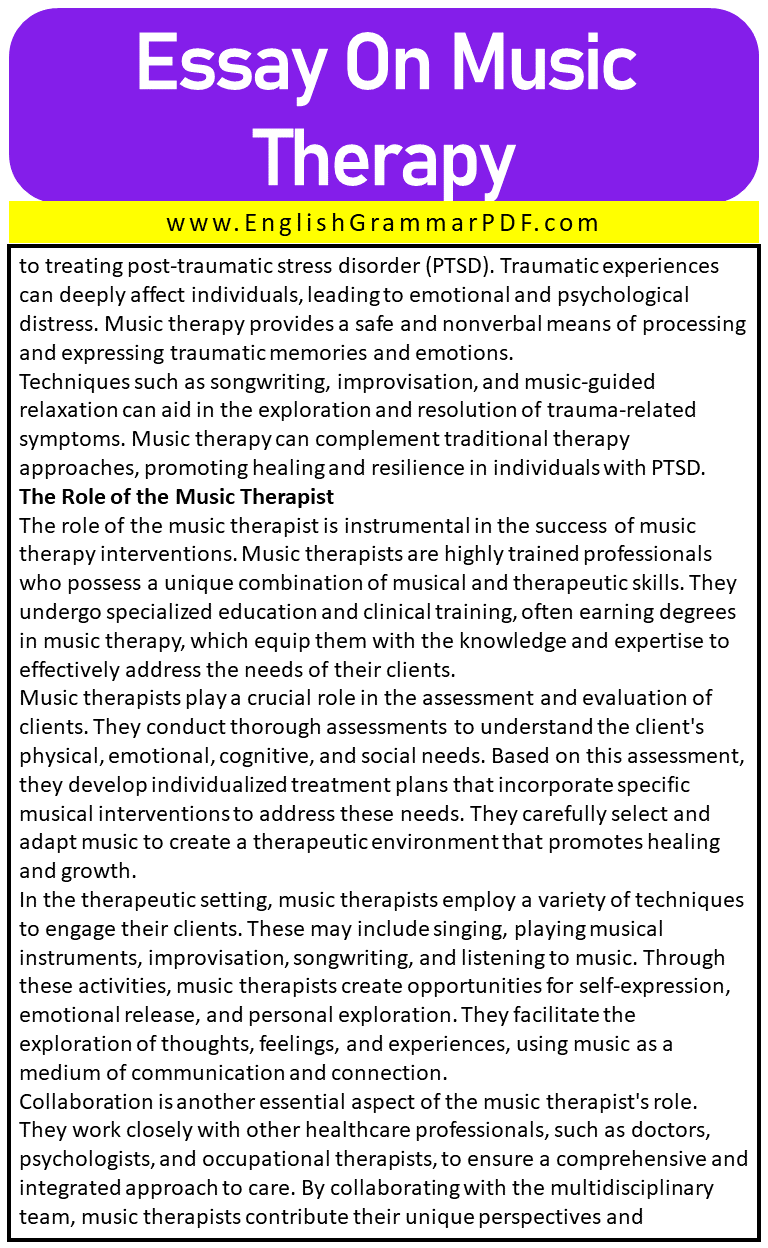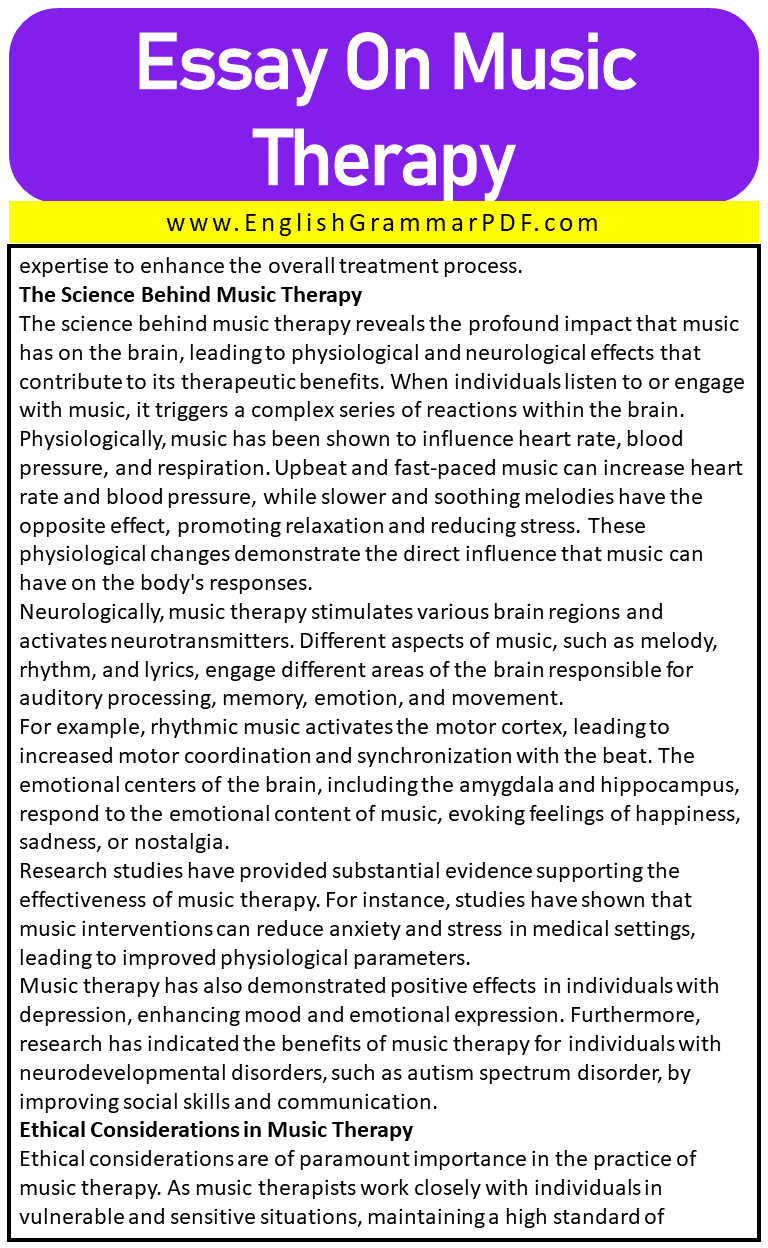Essay On Music Therapy
Outline of Essay:
- Introduction
- Applications of Music Therapy
- The Role of the Music Therapist
- The Science Behind Music Therapy
- Ethical Considerations in Music Therapy
Introduction
Music therapy is a unique and valuable form of treatment that utilizes the power of music to improve physical, mental, and emotional well-being. It involves the intentional use of music-based interventions by trained professionals to address the individual needs of clients. The importance and benefits of music therapy are widely recognized, making it an increasingly popular approach in various healthcare settings. This essay explores the historical background, the science behind music therapy, its applications in different domains, the role of music therapists, ethical considerations, and future directions and challenges in the field.
Applications of Music Therapy
Music therapy has proven to be highly beneficial in the treatment of mental health disorders. One of its primary applications is in reducing anxiety and stress through music interventions. The soothing and rhythmic qualities of music can help calm the nervous system, regulate breathing, and induce a sense of relaxation. Music therapy techniques such as deep breathing exercises, guided imagery, and listening to calming music can effectively alleviate symptoms of anxiety and stress.
Additionally, music therapy has shown promise in enhancing mood and emotional expression in individuals with depression. Music has the power to evoke emotions and create a sense of connection and comfort.
Through active engagement with music, individuals with depression can find a medium to express their emotions, gain a sense of catharsis, and experience moments of joy and upliftment. Music therapy sessions often involve listening to uplifting or emotionally resonant music, engaging in music-making activities, or discussing the emotions evoked by specific songs.
Music therapy can also be utilized as a complementary approach to treating post-traumatic stress disorder (PTSD). Traumatic experiences can deeply affect individuals, leading to emotional and psychological distress. Music therapy provides a safe and nonverbal means of processing and expressing traumatic memories and emotions.
Techniques such as songwriting, improvisation, and music-guided relaxation can aid in the exploration and resolution of trauma-related symptoms. Music therapy can complement traditional therapy approaches, promoting healing and resilience in individuals with PTSD.
The Role of the Music Therapist
The role of the music therapist is instrumental in the success of music therapy interventions. Music therapists are highly trained professionals who possess a unique combination of musical and therapeutic skills. They undergo specialized education and clinical training, often earning degrees in music therapy, which equip them with the knowledge and expertise to effectively address the needs of their clients.
Music therapists play a crucial role in the assessment and evaluation of clients. They conduct thorough assessments to understand the client’s physical, emotional, cognitive, and social needs. Based on this assessment, they develop individualized treatment plans that incorporate specific musical interventions to address these needs. They carefully select and adapt music to create a therapeutic environment that promotes healing and growth.
In the therapeutic setting, music therapists employ a variety of techniques to engage their clients. These may include singing, playing musical instruments, improvisation, songwriting, and listening to music. Through these activities, music therapists create opportunities for self-expression, emotional release, and personal exploration. They facilitate the exploration of thoughts, feelings, and experiences, using music as a medium of communication and connection.
Collaboration is another essential aspect of the music therapist’s role. They work closely with other healthcare professionals, such as doctors, psychologists, and occupational therapists, to ensure a comprehensive and integrated approach to care. By collaborating with the multidisciplinary team, music therapists contribute their unique perspectives and expertise to enhance the overall treatment process.
The Science Behind Music Therapy
The science behind music therapy reveals the profound impact that music has on the brain, leading to physiological and neurological effects that contribute to its therapeutic benefits. When individuals listen to or engage with music, it triggers a complex series of reactions within the brain.
Physiologically, music has been shown to influence heart rate, blood pressure, and respiration. Upbeat and fast-paced music can increase heart rate and blood pressure, while slower and soothing melodies have the opposite effect, promoting relaxation and reducing stress. These physiological changes demonstrate the direct influence that music can have on the body’s responses.
Neurologically, music therapy stimulates various brain regions and activates neurotransmitters. Different aspects of music, such as melody, rhythm, and lyrics, engage different areas of the brain responsible for auditory processing, memory, emotion, and movement.
For example, rhythmic music activates the motor cortex, leading to increased motor coordination and synchronization with the beat. The emotional centers of the brain, including the amygdala and hippocampus, respond to the emotional content of music, evoking feelings of happiness, sadness, or nostalgia.
Research studies have provided substantial evidence supporting the effectiveness of music therapy. For instance, studies have shown that music interventions can reduce anxiety and stress in medical settings, leading to improved physiological parameters.
Music therapy has also demonstrated positive effects in individuals with depression, enhancing mood and emotional expression. Furthermore, research has indicated the benefits of music therapy for individuals with neurodevelopmental disorders, such as autism spectrum disorder, by improving social skills and communication.
Ethical Considerations in Music Therapy
Ethical considerations are of paramount importance in the practice of music therapy. As music therapists work closely with individuals in vulnerable and sensitive situations, maintaining a high standard of ethical conduct is essential to ensure the well-being and trust of clients.
Confidentiality and privacy are fundamental ethical principles in music therapy. Music therapists must respect the privacy of their clients and keep all personal information confidential. This includes protecting the confidentiality of verbal and musical expressions shared during therapy sessions. Creating a safe and trusting environment where clients feel comfortable sharing their thoughts and emotions is crucial for the therapeutic process.
Cultural sensitivity and respect for diversity are also vital ethical considerations in music therapy. Music holds deep cultural significance, and different musical traditions and preferences may vary greatly among individuals. Music therapists must be knowledgeable about diverse musical practices and adapt their interventions accordingly. It is important to honor and respect the cultural backgrounds and beliefs of clients, ensuring that music therapy interventions are inclusive, appropriate, and sensitive to their unique needs.
Maintaining professional boundaries is another ethical consideration in music therapy. Music therapists must establish clear boundaries and avoid any dual relationships that may compromise the therapeutic relationship. They should refrain from engaging in personal or financial relationships with clients outside of the therapeutic context to uphold the integrity and professionalism of the therapy process.
FAQ’s
Why is music therapy important?
Music therapy is important because it offers a unique and effective approach to improving physical, mental, and emotional well-being. It utilizes the universal language of music to address a wide range of therapeutic needs.
What are the positive effects of music?
Music has numerous positive effects on individuals. It can reduce stress and anxiety, uplift mood, enhance cognitive function, improve memory, promote relaxation, facilitate emotional expression, and increase social interaction and communication skills.
Explore More Essays:
Download the PDF of the Essay:







